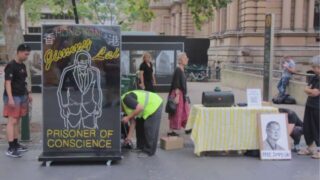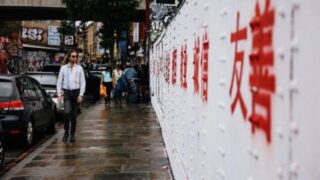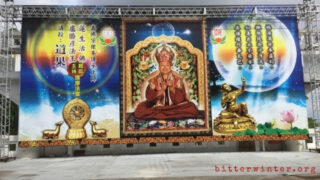Schools enforce restrictive measures on campuses to prevent students from expressing their support to the pro-democracy movement.
by Chen Zezhi
The Hong Kong pro-democracy protests, which started in June against proposals to allow extradition to mainland China, continue amid violent clashes between police and activists. In the face of the atmosphere of horror shrouding Hong Kong, many fearless young people, including school students, continue their fight for freedom. Under pressure from the central government in Beijing, school campuses are subjected to censorship, suppressing students’ freedom of expression.
Students prohibited from expressing political views


On September 18, Yan Oi Tong Tin Ka Ping Secondary School held a class representative meeting to discuss the ways how students can contribute to the discussions about politics in society and on-campus. Despite students’ objections, the school’s principal, Wu Jierong, banned the expression of political views by shouting political slogans on campus from September 30. She personally opposed to the shouting of slogans, believing that such activities may result in disputes with classmates who hold opposing views. The school should be a “quiet campus,” Ms. Wu added and threatened to punish anyone who violates the imposed rule.


According to students, the meeting was initially intended for pupils only. Most students were in favor of the idea to call out slogans in support of the Hong Kong democracy movement during lunch breaks, but the school’s vice-principal, surnamed Kong, asked them to “reflect on their behavior because it infringed on other teachers’ and students’ right to not listen.” Students disagreed, believing that people shouldn’t be prohibited from speaking out just because others don’t like what they hear. On the other hand, Mr. Kong was concerned that the principal’s decision to ban slogan-shouting from September 30 might be perceived as suppression of the rights of students. He put forward an idea to allow the shouting of slogans subside naturally, a proposal that the majority of students supported.


But principal Wu Jierong said that she is the one with decision-making power, and insisted that students stop shouting slogans before the end of September, with no room for discussion.
School blatantly retracts the pledge to allow free speech
Students supporting the pro-democracy movement in other Hong Kong schools have been similarly suppressed. Apple Daily, a Hong Kong publication that is critical of Beijing and Hong Kong governments, and therefore banned in mainland China, reported about an analogous case.
On September 6, students shouted slogans in support of democracy during a lunch break on the campus of a high school. Mr. Huang, a disciplinary teacher (a person assigned to each grade in the school to maintain order and resolve issues among students), ordered the students vehemently to return to their classrooms. He loudly scolded them and repeatedly questioned if they “support these thugs.” He criticized the demonstrators for blocking traffic and destroying public property, startling many students to the point of tears. A parent of one of the students said that her daughter was emotionally agitated after returning home that day.
A student commented online that the school required those involved in the incident to write “confession statements.” The school also continuously coaxed students, asking them whether anyone said something to provoke the disciplinary teacher to use the word “thugs.” Students felt upset and stressed.
On September 16, a recording circulated online of the school administration trying to justify Mr. Huang’s behavior and promising to be open-minded about activities in which students express their political views. But just a day later, the school’s principal, Wu Jierong, reneged on her pledge. She prohibited students from shouting slogans and expressing their political views, intimidating and threatening them. A netizen pointed out angrily that this is “white terror” and called to resist such acts.
The young determined to continue fighting
As described in another Apple Daily report, on September 19, ELCHK Yuen Long Lutheran Secondary School prohibited students from wearing black shirts and black pants, the unofficial uniform of the Hong Kong demonstrations, on “casual days,” they could only have one piece of clothing in black. Black face-masks have also been forbidden on campus. The school administration proclaimed that no politics should be brought to school. If a student violates this rule, his or her parents will be asked to come to school and take them home. Teachers and other school employees must also comply with these regulations.
In the past, the school never placed any such restrictions on the clothing of students. Some commented that these new orders give the impression that the school is exerting pressure on its students.
Young people in Hong Kong continue fight for freedom and democracy. They have their own judgment and understanding of the importance to keep up this struggle. On the first day of the school year, September 2, about 10,000 students from 200 secondary schools and universities boycotted classes and joined a broad two-day strike and rally.
At the rally, a young Hong Kong activist told SBS, the Australian public broadcasting network, that he was willing to die for democratic Hong Kong. “Because this is my home. Why won’t you fight for your home?” he said sobbing. “Do you see the students around here? … When 2047 [the year when the Basic Law of Hong Kong that sets the basis for the relationship between the special administrative region and China’s central government], these students will all become middle-aged, and they will all be slaves. We will all be slaves. If we don’t fight right now, we won’t have another chance.”
A college student activist on the frontlines told Bitter Winter that he is persisting in fighting because he has seen how the government abuses its power and indiscriminately arrests people. He said that the authorities are entirely indifferent to the needs of citizens. He hopes that the Hong Kong government and police force will both be reformed and that the region’s leaders could be elected through universal suffrage, with no curtailment from the central government in Beijing.
A 15-year-old at St. Francis’ Canossian College (the same school that Hong Kong chief executive Carrie Lam attended) said in an interview with the Hong Kong magazine Ming Pao Weekly that even though studying is important, the young cannot stay out during this social unrest. She added that high school students are also members of society, and they have to speak out; otherwise, they won’t even have the opportunity to study or enter the next grade of school.









